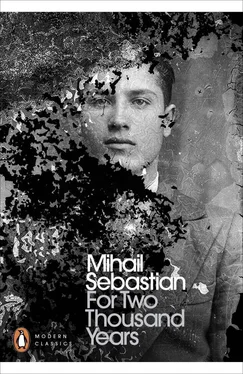*
I ate at the canteen between a bad-smelling loud-talking Russian and a thin girl with chapped hands and badly applied lipstick. A concrete floor, the cold, a coat thrown over my shoulders, a plate shoved before me, a tin fork on the ground.
I’m never going to be a social revolutionary, I who in that moment somehow managed a cheerful smile.
There are eleven boys in the room, including me. Sadigurski Liova, my neighbour to the right, shaves with the old razors given to him by Ionel Bercovici, my neighbour to the left. I’m still guarded in my interactions here. I fear greater familiarity.
Towards morning, whenever I happen to wake, I like to listen to the chorus of breathing of the ten people around me, in this long, cold room: the rasping breath of the polytechnic student by the door, his neighbour’s fluting whistle, Liova’s sighing, the bumblebee buzz of someone towards the back, by the window and, above them all, the loud, penetrating, animal snore of Ianchelevici Şapsă, the giant.
*
I watch how they return in the evening from the university, in dribs and drabs, or singly, worn out. And each one grimly enumerates the fights he’s got into, like a billiard score, so that a competitor won’t steal their points.
Marcel Winder is up to fifteen. The other day his hat also got ripped, which puts him well ahead on the road to martyrdom. Loudly, in the middle of the yard, he points out each of his wounds. This one and this one and this one …
*
Today they removed Ianchelevici Şapsă’s mattress. He hasn’t paid his bill for three months and they’re taking action. He watched calmly, leaning against the wall, without protest. In the evening he laid down on his bed board and uttered a choice curse. I threw him one of my pillows. He sent it sailing back, high through the air, nearly smashing the lamp, and turned over to face the wall.
*
It was a tough day. It’s been decided that we absolutely have to get into the civil law faculty, where they grade you for attendance. Up until now we’ve only been going in scattered groups of three people at most. This avoids major confrontations, but it achieves nothing as they usually identify us all and kick us out.
So today we had to change our tactics. We entered in a compact group and sat in the front rows, by the lectern. We don’t respond to minor provocations, but defend ourselves if we’re attacked. ‘Until the end’ — that was the slogan.
It’s a bad strategy, I think, but I’m not going to tell the boys that, so thrilled are they with today’s success. We gave as good as we got, perhaps, but did nobody notice Liebovici Isodor, jammed in the corner by the blackboard, with his coat ripped and a bloody split lip? Ianchelevici Şapsă did wonders: he was pale and serious, holding the leg of a chair he had broken off for the fight.
Evening. Marcel Winder made a list of those who were beaten up, to give to the paper. I told him to rub my name out: I don’t think I received more than two blows and, more to the point, Mama doesn’t need to find out.
*
Calm exteriors. Perhaps antagonism has acquired a certain style.
‘Dear colleague, would you kindly show me your student identification card?’
Three of them surround me, waiting. I take out my student card and display it to the one who spoke.
‘Aha! Please vacate the lecture hall. Come along.’
He points the way.
*
Liebovici Isodor got badly beaten up. Again. I wasn’t there, but heard from Marga Stern, who was.
I’m rather fond of his curt manner, his proud, firm reserve.
‘Again, Liebovici?’
‘Again, what?’
‘They beat you up again.’
‘No.’
‘Of course they did.’
‘All right, they did, then … You seem to know all about it.’
He turns and leaves, irritated, head bowed.
I lost my gloves in the scuffle or they were taken. And the weather is icy … Damn.
*
No, I’m not the tough kind. Where are the oaths I made two years ago, on the freshly shut cover of Zarathustra? Why did I wander aimlessly in the street last night, alone, miserable because I was unable to cry and terrified at the same time that I might have been about to? Why in the evening, when I lay my head on my pillow, is it like collapsing in exhaustion after being chased?
Imbecile. Three times over.
What depresses me most is the feeling of losing, with each day, the refuge of solitude, of finding myself in solidarity with Marcel Winder and Ianchelevici Şapsă, descending the stairs together, united in common feeling, becoming one with them, the same as them, a fellow sufferer and sympathizer. Jewish fellow-feeling — I hate it. I’m always on the brink of shouting out a coarse word, just to show that even though I’m in the midst of ten people who believe me their ‘brother in suffering’, I am in fact absolutely, definitively alone.
Listen, Marcel Winder, if you pat me on the shoulder one more time, I’ll punch you out. My business if I’m hurt, your business if your skull gets cracked. I’ve nothing to share with you, you don’t need anything from me. You go your way and I’ll go mine.
*
We’ve had no fire for three days. We’re out of wood and awaiting a promised subsidy.
Liova is sick, a fever of 39 degrees. An intern from Caritas came to see him and promised to take him there as soon as a bed becomes available.
The polytechnic student has got frostbitten ears and a big yellowing bandage covers his entire cheek. It turns my stomach at mealtimes in the canteen, along with the tattered cotton wool and gutta-percha.
Ianchelevici Şapşa has washed his socks and hung them on the edge of the bed to dry. A girl was looking for him today. I think she’d come from a market in his town and she brought him a bag of walnuts. He laughed awkwardly: I think he was embarrassed to receive her in front of us.
Am I not ridiculous here, with my fussy judgements, and minding how I ‘carry’ myself? An aesthete. That’s what I am. ‘Decency, reserve, solitude’ — worthless virtues that oblige you to grin through the pain.
Unshaven for four days. It’s too cold to spend a quarter of an hour in front of the mirror.
*
Things could have gone badly today. I was coming down from the administrative offices, where I’d gone to get warm, and was two steps from the door when Ştefăniu went out ahead of me. He hadn’t noticed me. I’ve just realized that. But I lacked composure and foolishly spun about to avoid him, and that’s when he saw me. He could only reach me with his walking stick (a good blow on the right shoulder). I ran from him, though this risked attracting the attention of the others, and took a left into the hall. With him in pursuit. I went through the upper gallery, towards the senate, calculating I could stop in the chancellery. But there was no key in the door and I wouldn’t have been able to hold it shut indefinitely with my shoulder. Luckily the door to the senate steps was open. Once out in the street, I supposed he wouldn’t pursue me. And he didn’t.
And I should write to Mama this evening. But what?
Ten in the evening. A while ago the Bessarabian medical student brought two pieces of wood in the pockets of his overcoat. But since we haven’t had a fire for so long the stove smokes and now it’s gone cold again and the acrid smell in the room chokes Liova.
Somebody went out and left the door open. Nobody gets up to close it. Ionel Bercovici is playing poker on his bed with Marcel Winder and two others whom I don’t know.
You can hear Liova coughing from time to time. Somebody is beating his hands together, either because the coughing annoys him or because he’s cold.
Saturday evening
Every Jew is a king
And every corner of the house rings with laughter
Читать дальше












